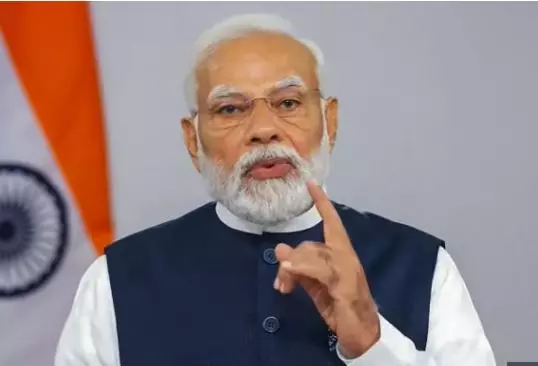
PM Modi favoured in India but less so globally: Survey
text_fieldsNew Delhi: In a recent survey conducted by the Pew Research Centre, global confidence in Indian Prime Minister Narendra Modi's handling of world affairs appears to be mixed, with opinions varying significantly across different nations.
The survey, which collected responses from over 30,800 adults in India and 23 other countries, sheds light on perceptions of India's global power, Modi's leadership, and how Indians view other nations.
The survey found that while India garners relatively positive opinions among the surveyed nations, there are variations in the extent of favourability. A median of 46% of respondents expressed a favourable view of India, with 34% holding an unfavourable opinion and 16% remaining neutral.
Israel stood out as a nation with the most favourable view of India, where a remarkable 71% of respondents expressed positivity. This statistic highlights the strengthening of security and economic cooperation between India and Israel in recent years.
On the domestic front, nearly 80% of Indian respondents voiced a favourable opinion of Prime Minister Modi, with 55% holding a "very favourable" view. This contrasted with about 20% of Indian respondents who held an unfavourable view. However, outside of India, opinions about Modi's competence in handling global affairs were less resolute.
Around 40% of respondents from 12 other surveyed nations lacked confidence in Modi's ability "to do the right thing regarding world affairs," while approximately 37% expressed confidence in his capabilities. Notably, Brazilian and Mexican respondents appeared to be the most critical, with a majority expressing "not too much" or "no confidence" in Modi's global leadership.
Despite Israel's highly favourable opinion of India, there was a nuanced perspective regarding Modi. About 42% of Israeli respondents lacked confidence in Modi's global leadership, slightly exceeding the 41% who expressed confidence.
The survey also delved into perceptions of India's global influence. Indian respondents exhibited optimism, with 68% believing that India's influence in the world had strengthened in recent years. This contrasted with a global viewpoint, where only 28% of respondents across 19 countries in a previous survey felt that India's influence was on the rise.
Furthermore, the survey revealed intriguing insights into how Indians perceive other major players in global affairs. Nearly half of Indian respondents believed that the United States had gained influence, likely due to the strengthening strategic partnership between the two countries amid concerns over China's rise. Similarly, 41% of Indian respondents felt that Russia had gained influence, possibly reflecting the enduring defence ties between India and Russia.
In contrast, India's perspective on China's influence was mixed. While 38% believed China's influence had grown, 31% felt it had weakened. Indians' overall view of China was predominantly critical, with 67% expressing an "unfavourable" opinion, the highest among all surveyed nations. This sentiment could be influenced by the ongoing military tensions between India and China along their disputed border since 2020.
Lastly, the survey noted that Indian sentiment toward Pakistan remained unfavourable, with 73% of Indian respondents holding an unfavourable view of their neighbour. This marked a 5-percentage point increase since a previous Pew Research survey in 2018. Of these respondents, 57% held a "very unfavourable" opinion about Pakistan.























